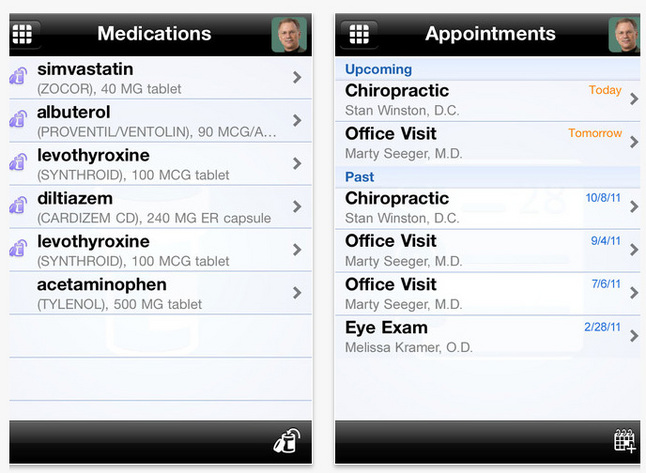Editor's note: This story has been edited to show when the University of Michigan Health System made the switch to electronic hospital records.
Clik here to view.

Screenshots of the free MyChart app, developed by Epic Systems, that will be available to University of Michigan Health System patients beginning Aug. 15. Patients can access parts of their medical records, test results and doctor's appointments on their smart phones.
Courtesy of iTunes
Beginning Aug. 15, certain portions of patients’ medical history will be available online and on an app. The app, called MyChart, is free and can be found under the “Medical” category in the app store.
At this point, the online portal — called www.myuofmhealth.org — only includes information on parts of the patient’s history that happen at UMHS.
The patient portal and app are available through UMHS’ contract with Epic Systems, a Madison-based health record software firm.
UMHS switched to an all-electronic records system about a decade ago and has been transitioning to the Epic system throughout this year.
During UMHS' fiscal year-end budget presentation to the U-M Board of Regents in June, the switch to the Epic software was included as a part of expenses that UMHS officials said contributed to its 0.5 percent operating loss. UMHS has used an electronic system for their hospital records for more than a decade.
St. Joseph Mercy Health System made the transition to electronic records in 2009 and uses the software provider Cerner.
Many health systems in Michigan that use the Epic software have offered or will offer MyChart, according to an Epic spokeswoman.
Active immunizations and allergies can be viewed in the portal, as well as test results. Family medical history and any social history given to U-M staff will be put into the portal after a clinic visit.
People with asthma and other conditions that require frequent medication refills can fill out online requests for prescription renewals.
Records of vaccinations, medications, allergies and some medical history also can be printed out directly from the portal.
Patients can keep track of their appointments, and can access some test results and doctor’s opinions through the app or the online portal as they become available.
A messaging function between the patient and the doctor’s office also is intended to eliminate phone calls.
“This allows patients to become more active participants in their care,” according to a statement from Dr. Margaret Punch, associate medical director of the Faculty Group Practice Ambulatory Care Services and associate professor of obstetrics and gynecology at U-M Medical School.
“Allowing secure, online access to health information is really just a reflection of everything else happening in society as consumers come to expect convenient access to most services. We know that patients want accurate and timely information.”
